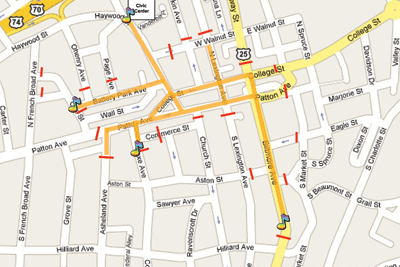This year's festival will close at 10 p.m. on Friday and Saturday, an hour earlier than in the past. Two main stages have been eliminated. There won’t be any ticketed musical events, and about a dozen fewer free musical acts will perform during the festival’s three-day run July 24-26. There's one less food court, and all children's activities will be housed indoors at the Asheville Civic Center.

"Financially, it made sense to do it," says Sandra Travis, who directs Bele Chere for the city. "I feel really good about how we're doing things. We're going through that budget with a fine-toothed comb."
All told, the city plans to slash its Bele Chere spending by about $330,000 this year. That's about a 40 percent cut, including a $125,000 reduction in the entertainment budget.
A number of small changes have added up to big savings, notes Travis. Having two food courts instead of three means needing one ice truck instead of two. Moving the children's activities indoors cuts down on expenses for generators and electrical service, she explains. The festival is also considering reusing old banners and decorations instead of buying new ones.
For a time, it seemed that Bele Chere would just keep bulking up. Launched on a single downtown street in 1979 to lure visitors to Asheville's then-dreary downtown, the festival muscled into more territory and drew bigger crowds every year. Tourist dollars flowed to craft vendors, musicians and downtown businesses alike.
Now billed as the Southeast's biggest free outdoor festival, the annual event has tallied more than 300,000 “visits” in recent years. (Lacking an official head count, organizers instead tally festival visits.)
The downsizing comes amid one of the toughest economic climates Asheville and the country as a whole have seen. But it’s not just the recession that’s tamping down the festival. For the past couple of years, city leaders have been contemplating Bele Chere’s future, in response to long-running concerns.
Some local merchants said the teeming masses clogging city streets were actually bad for business. Local musical acts snubbed by an event that kept looking farther afield for talent cooked up their own "Anti-Bele Chere" concert. And despite its size, massive street party often bled red ink, forcing City Council to spend taxpayer dollars to make up the shortfall.
There was a general sense that the festival was getting out of control, and in 2007 the city held forums to solicit feedback and start charting a new course for the three-day bash.
"I'm excited,” says Travis, who took the helm this year from longtime Festivals Coordinator Melissa Porter. “We need to bring this back home," declares Travis, who's been working with the event since 1988. "For locals who have avoided Bele Chere because it was too big, I would like them to come back and give it a try again. It won't be as overwhelming."



And just how are the Bele Chere “elves” going to keep the massive crowds from showing up and cramming into the smaller area (thus making it even more crowded)?